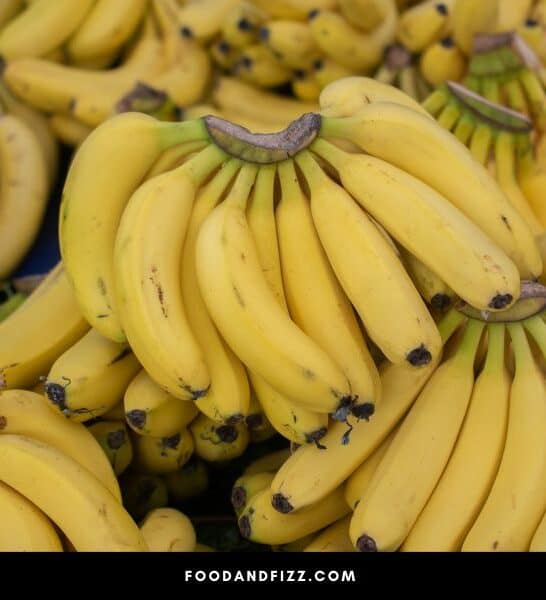We commonly refer to the groups of bananas sold at grocery stores as “bunches” of bananas. However, did you know that a bunch is actually more than that?
The real meaning of the word refers to a completely different thing, and you’ll be surprised to know how big of a difference it really is!
How Much Does A Bunch Of Bananas Weigh?
A bunch of bananas, also called a cluster, weighs anywhere from 17-110 pounds and is composed of three to twenty tiers, each of which is called a “hand”. Each hand is composed of an average of twenty individual fruits and is also known as a “finger.” A bunch of bananas can actually contain hundreds of bananas.
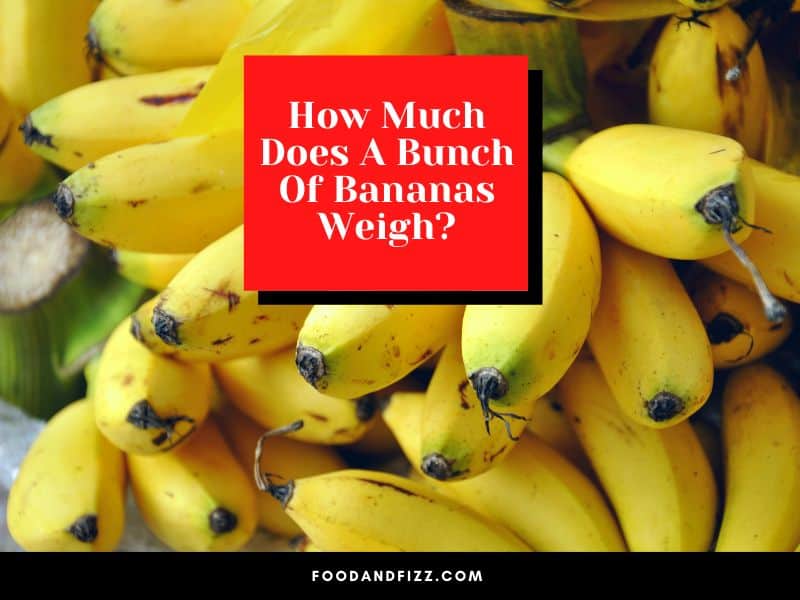
What A Bunch of Bananas Really Means
So the real meaning of a bunch of bananas is actually that whole cluster of bananas that grows on one single stem, which usually comprises anywhere from 3-20 of the grocery store “bunches”.
So in fact, a bunch of bananas is not just a few individual pieces of bananas; it literally means hundreds of bananas!
That’s a pretty huge difference, and if you ask me, it’s definitely not something you would ever want to get confused about.
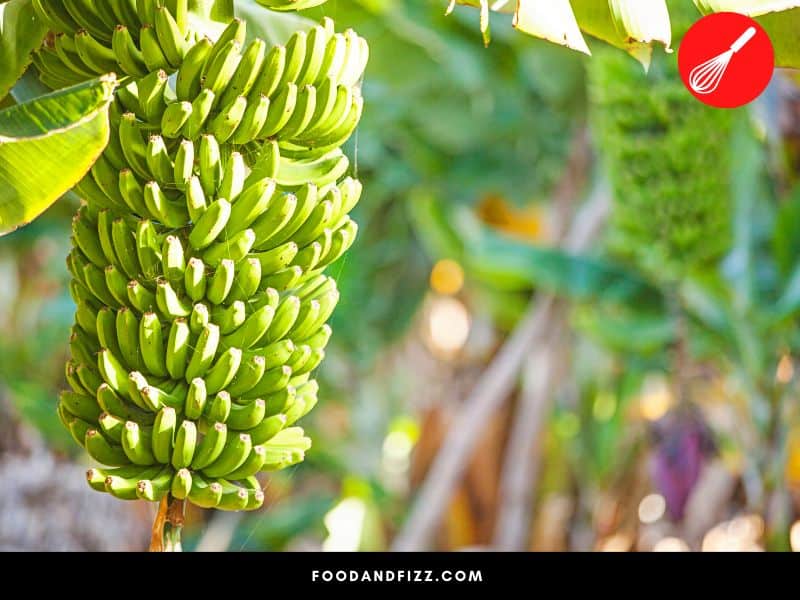
You’re Likely Buying A Hand of Bananas
What we really mean when we say we’re buying a bunch of bananas is actually a hand of bananas. A hand of bananas contains up to 20 individual banana fruits, which are called fingers. An average of 20 fingers make up one hand.
Three to twenty hands of bananas make up a cluster or a real bunch of bananas.
How Much Does A Bunch Of Bananas Weigh?
An average banana weighs about 4 ½ oz, so if a hand of bananas contains about 20 individual fruits, it means that the average weight of a hand of bananas is about 90 oz or roughly 5 ¾ pounds.
If a bunch of bananas contains three to twenty hands of bananas, we can say that a bunch of bananas weigh anywhere from 17 pounds to 110 pounds.
How Much Does A Hand of Bananas Weigh?
A hand of bananas contains an average of 20 fruits, which weigh about 4 1/2 oz each. A hand of bananas weighs, on average, about five ¾ pounds.
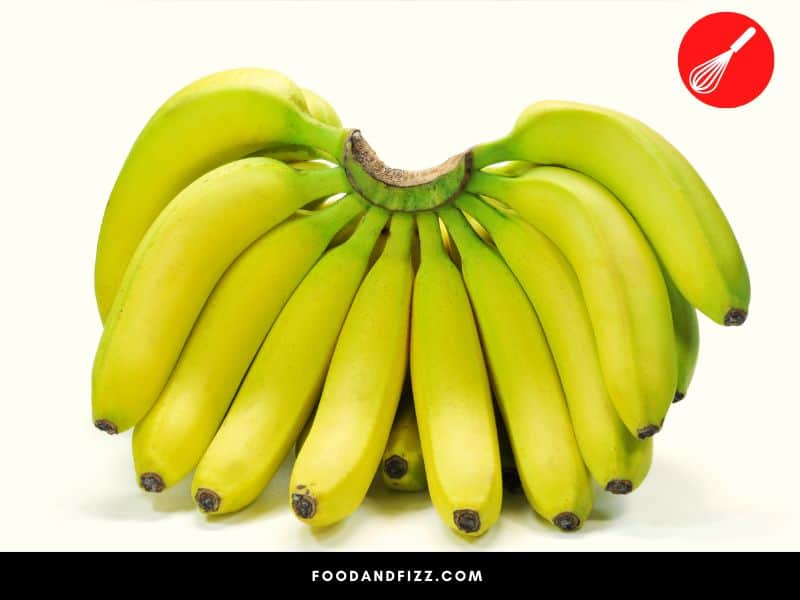
How Do Bananas Grow?
Did you know that bananas are actually herbs, not trees? While we call them “banana trees”, they are actually botanically considered herbs because they do not have woody stems and do not grow from seeds but rather from a bulb or rhizome underground.
In this way, they are somewhat distantly related to ginger.
Bananas are a tropical fruit that needs rain, sunshine, and rich soils and need warm temperatures averaging 80°F. Banana plants are perennial plants, meaning that they grow year-round and do not have a growing season.
Fruits don’t come easily, though, as it typically takes between 9-12 months from when the bulb is sown for it to bear fruit. Banana plants are typically considered labor-intensive to grow.
Bananas are mostly produced in Asia, Latin America, and Africa, with the biggest producers being India and China and the biggest exporters being Ecuador and the Philippines.
What to Do When You Have Too Many Bananas
Okay, so you bought too many bananas, and you know they’ll just go bad on you if you don’t do anything. What can you do with them?
1. Wrap the Stems and Keep Them Separate From Other Fruits
Since bananas are climacteric fruits or fruits that continue to ripen after being picked, they, unfortunately will keep ripening on your counter. If you bought too many of them, it won’t be long until you have a pile of overripe bananas in your home.
To delay this, wrap the stems of your bananas to slow down the release of ethylene gas, which is what makes the fruit go ripe faster. Wrapping the stems in foil or cling wrap will delay this process.
Keeping them away from other fruits that produce their own ethylene gas will also slow down this process.
This means that you’ll have several more extra days of eating your bananas before they go overripe.
2. Use Them For Baking and Cooking
Bananas do not just make great toppings for oatmeal, pancakes, and waffles. You can actually mix them into your batter and make delicious, fluffy pancakes and waffles!
This is because bananas can replace some of the eggs and fat in your recipes. This is actually very common in vegan recipes. Generally, one mashed, ripe banana can replace one egg.
I actually add a mashed banana to my overnight oats, too. I find that it gives it that creamy texture and a pleasant sweetness without having to add extra sweeteners. It is especially delicious in anything with peanut butter!
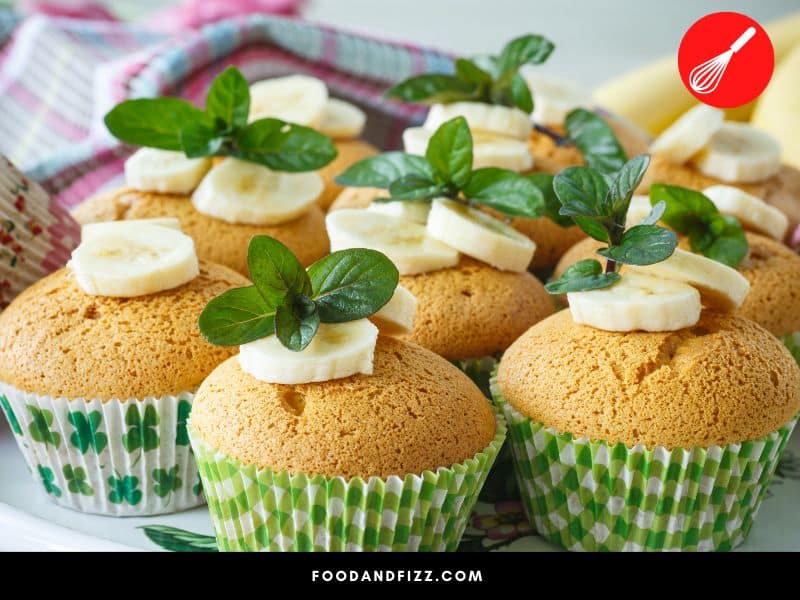
3. Freeze Your Extra Bananas
Freezing your extra bananas ensures that you can use them for a longer period of time. To prevent browning and oxidation, most cooks recommend flash-freezing bananas. Meaning once you peel and slice the bananas, you work quickly to freeze them right away
A simple process is outlined below:
- Place freezer in coldest setting possible and ensure that you have space to put your bananas
- Peel your bananas and slice them.
- Working quickly, place in a single layer in airtight freezer bags and quickly seal them, getting out as much air as possible.
- Place each bag in the freezer and ensure they are laid out flat to prevent them from clumping.
- Freeze until frozen solid, about two hours.
You can thaw the frozen bananas at room temperature for half an hour to an hour before using them in your recipes. But if you’re making smoothies, just go ahead and add them as is.
4. Make More Smoothies
Having frozen banana slices in the freezer actually makes it easier to add more smoothies to your life. Because of their sweetness and flavor, it doesn’t really take much to make a good breakfast smoothie.
I’ll share with you my basic breakfast smoothie below.
Kale And Banana Breakfast Smoothie
Ingredients
- 1 cup Kale Leaves (washed and chopped, tough stems removed)
- 1 cup Milk of Choice, Plain Water, or Coconut Water
- 1 cup Frozen Banana Slices
- 2 Tablespoons Natural Peanut Butter
- ½ teaspoon Spirulina Powder (optional)
Procedure
Mix all of your ingredients into a blender and mix them until they are well-blended. You can adjust by adding more milk if it comes out too thick. You can also add other things like chocolate chips, a handful of berries, or chia seeds.
I usually do not use any type of extra sweetener for this as, for me, the bananas are already sweet enough. But if you wish to add more sweetness, you can add some honey, maple, or agave syrup to the mix!
I really believe that it’s the frozen bananas that make this smoothie extremely delicious.
Why Do People Love Bananas?
A banana is a yellow, tropical fruit grown mostly in the tropical regions of Asia, South America and Africa. It is a popular and well-loved fruit not only because of its health benefits but because of its delicious taste and its many uses in the kitchen.
A banana is an excellent on-the-go snack that is perfect for a quick breakfast or a pre and post workout snack.
It works wonderfully in smoothies and is used a lot in cooking and baking as an egg or fat substitute, and makes the best pancakes, bread, and muffins, and yes, even ice cream!
It has an indulgent, sweet taste, yet they are extremely healthy.
Some health benefits include:
- Rich source of potassium promotes heart and kidney health and regulates blood pressure. According to Harvard T.H. Chan School of Public Health, potassium is a very important electrolyte and mineral that helps our nerve cells send signals to the heart and muscles to ensure proper functioning.
- Contains Vitamin A, B, C, and magnesium which is necessary for vital processes in the body.
- Low-calorie snack that helps replenish electrolytes lost after a workout.
- Contains antioxidants and fiber.
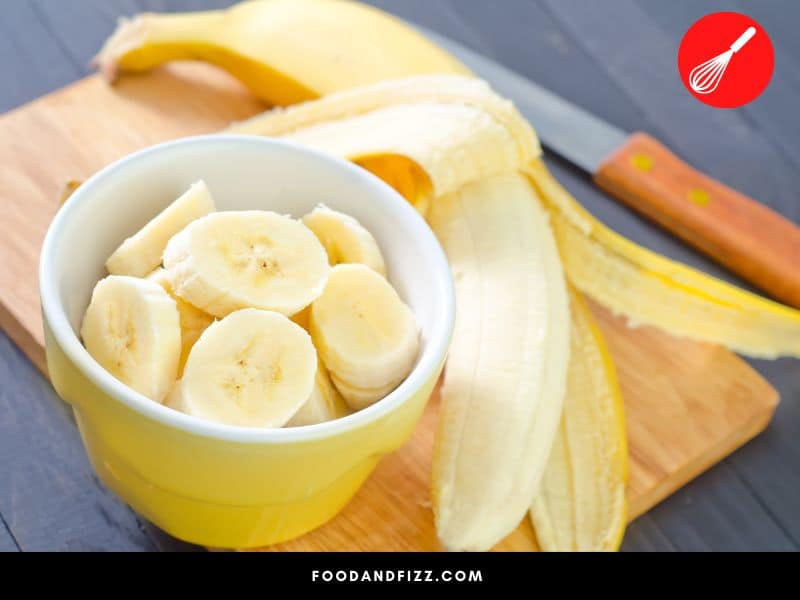
Interesting Banana Facts
- Banana peels are nutritious and edible and is eaten in many parts of the world. Some have also turned into very interesting vegan bacon!
- Banana peels can soothe itchy mosquito bites.
- In the Philippines, it is more common to see banana ketchup than regular tomato ketchup.
- Banana beer, made from fermented bananas, is very popular in Africa.
- Bananas are considered berries, and strawberries aren’t!
- There are over 1,000 banana varieties.
- All bananas sold commercially are cloned from one variety – the seedless Cavendish banana.
- Horticulturalists believe that bananas were the very first fruit on earth.
- According to the Guinness Book of Records, the largest bunch of bananas was harvested in Spain and weighed 287 lbs. This bunch contained 473 individual bananas!
Frequently Asked Questions to How Much Does A Bunch of Bananas Weigh?
How Much Does An Average Banana Weigh?
An average banana weighs 4 ½ ounces or 125 grams.
How Much Does a Bunch of Bananas Weigh in Kg?
A bunch of bananas can weigh anywhere from 7 to 50 kg.
How Many Bananas Are in One Pound?
There is an average of 3 bananas in one pound.
Are Bananas the Same as Plantains?
Botanically speaking, bananas and plantains are the same. However, plantains are typically starchier and are cooked before eating. Bananas are eaten uncooked and contain more sugar.
Conclusion to How Much Does A Bunch of Bananas Weigh?
The bananas we typically see sold in stores are actually called “hands” of bananas, not bunches of bananas. A bunch of bananas contains up to 20 hands and contain hundreds of bananas.
A bunch of bananas typically weighs anywhere from 17 pounds to 110 pounds, with the biggest bunch ever recorded containing 473 bananas and weighing 287 pounds!

